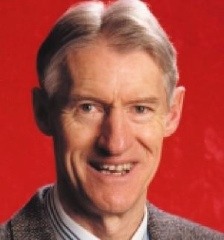Related Research Articles

Happiness is a positive and pleasant emotion, ranging from contentment to intense joy. Moments of happiness may be triggered by positive life experiences or thoughts, but sometimes it may arise from no obvious cause. The level of happiness for longer periods of time is more strongly correlated with levels of life satisfaction, subjective well-being, flourishing and eudaimonia. In common usage, the word happy can be an appraisal of those measures themselves or as a shorthand for a "source" of happiness. As with any emotion, the precise definition of happiness has been a perennial debate in philosophy.
Personality is any person's collection of interrelated behavioral, cognitive and emotional patterns that comprise a person’s unique adjustment to life. These interrelated patterns are relatively stable, but can change over long time periods.

Hans Jürgen Eysenck was a German-born British psychologist who spent his professional career in Great Britain. He is best remembered for his work on intelligence and personality, although he worked on other issues in psychology. At the time of his death, Eysenck was the most frequently cited living psychologist in the peer-reviewed scientific journal literature.
Positive psychology studies the conditions that contribute to the optimal functioning of people, groups, and institutions. It studies "positive subjective experience, positive individual traits, and positive institutions... it aims to improve quality of life."

Thomas Dashiff Gilovich an American psychologist who is the Irene Blecker Rosenfeld Professor of Psychology at Cornell University. He has conducted research in social psychology, decision making, behavioral economics, and has written popular books on these subjects. Gilovich has collaborated with Daniel Kahneman, Richard Nisbett, Lee Ross and Amos Tversky. His articles in peer-reviewed journals on subjects such as cognitive biases have been widely cited. In addition, Gilovich has been quoted in the media on subjects ranging from the effect of purchases on happiness to perception of judgment in social situations. Gilovich is a fellow of the Committee for Skeptical Inquiry.

Nicholas Keynes Humphrey is an English neuropsychologist based in Cambridge, known for his work on evolution of primate intelligence and consciousness. He studied mountain gorillas with Dian Fossey in Rwanda; he was the first to demonstrate the existence of "blindsight" after brain damage in monkeys; he proposed the theory of the "social function of intellect". He is the only scientist to have edited the literary journal Granta.
Relative deprivation is the lack of resources to sustain the diet, lifestyle, activities and amenities that an individual or group are accustomed to or that are widely encouraged or approved in the society to which they belong. Measuring relative deprivation allows an objective comparison between the situation of the individual or group compared to the rest of society. Relative deprivation may also emphasise the individual experience of discontent when being deprived of something to which one believes oneself to be entitled, however emphasizing the perspective of the individual makes objective measurement problematic.

[[File:|thumb|Michael Argyle]] Michael Argyle was one of the best known English social psychologists of the twentieth century. He spent most of his career at the University of Oxford, and worked on numerous topics. Throughout his career, he showed strong preferences for experimental methods in social psychology, having little time for alternative approaches such as discourse analysis.

Daniel Todd Gilbert is an American social psychologist and writer. He is the Edgar Pierce Professor of Psychology at Harvard University and is known for his research with Timothy Wilson of the University of Virginia on affective forecasting. He is the author of the international bestseller Stumbling on Happiness, which has been translated into more than 30 languages and won the 2007 Royal Society Prizes for Science Books. He has also written essays for several newspapers and magazines, hosted a non-fiction television series on PBS, and given three popular TED talks.

Richard Eugene Nisbett is an American social psychologist and writer. He is the Theodore M. Newcomb Distinguished Professor of social psychology and co-director of the Culture and Cognition program at the University of Michigan at Ann Arbor. Nisbett's research interests are in social cognition, culture, social class, and aging. He received his Ph.D. from Columbia University, where his advisor was Stanley Schachter, whose other students at that time included Lee Ross and Judith Rodin.
A cognitive module in cognitive psychology is a specialized tool or sub-unit that can be used by other parts to resolve cognitive tasks. It is used in theories of the modularity of mind and the closely related society of mind theory and was developed by Jerry Fodor. It became better known throughout cognitive psychology by means of his book, The Modularity of Mind (1983). The nine aspects he lists that make up a mental module are domain specificity, mandatory operation, limited central accessibility, fast processing, informational encapsulation, "shallow" outputs, fixed neural architecture, characteristic and specific breakdown patterns, and characteristic ontogenetic pace and sequencing. Not all of these are necessary for the unit to be considered a module, but they serve as general parameters.
Klaus Rainer Scherer is former Professor of Psychology and director of the Swiss Center for Affective Sciences in Geneva. He is a specialist in the psychology of emotion. He is known for editing the Handbook of Affective Sciences and several other influential articles on emotions, expression, personality and music.
Edward Francis Diener was an American psychologist and author. Diener was a professor of psychology at the University of Utah and the University of Virginia, and Joseph R. Smiley Distinguished Professor Emeritus at the University of Illinois, as well as a senior scientist for the Gallup Organization. He is noted for his research over the past thirty years on happiness, including work on temperament and personality influences on well-being, theories of well-being, income and well-being, cultural influences on well-being, and the measurement of well-being. As shown on Google Scholar as of April 2021, Diener's publications have been cited over 257,000 times.
Despite a large body of positive psychological research into the relationship between happiness and productivity, happiness at work has traditionally been seen as a potential by-product of positive outcomes at work, rather than a pathway to business success. Happiness in the workplace is usually dependent on the work environment. During the past two decades, maintaining a level of happiness at work has become more significant and relevant due to the intensification of work caused by economic uncertainty and increase in competition. Nowadays, happiness is viewed by a growing number of scholars and senior executives as one of the major sources of positive outcomes in the workplace. In fact, companies with higher than average employee happiness exhibit better financial performance and customer satisfaction. It is thus beneficial for companies to create and maintain positive work environments and leadership that will contribute to the happiness of their employees.

Mark van Vugt is a Dutch evolutionary psychologist who holds a professorship in evolutionary psychology and work and organizational psychology at the VU University Amsterdam, the Netherlands. Van Vugt has affiliate positions at the University of Oxford, Institute for Cognitive and Evolutionary Anthropology (ICEA).
The Newcastle Personality Assessor (NPA) is a personality test designed to measure the test-taker's personality on five dimensions: Extroversion, Neuroticism, Conscientious, Agreeableness, and Openness. The 10-questions assessor was developed by Daniel Nettle, a behavioral scientist at the Centre for Behaviour & Evolution, Newcastle University.

Jennifer Aaker is an American behavioural scientist and General Atlantic Professor and Coulter Family Fellow at the Stanford Graduate School of Business. She is known for her research on time, money, and happiness. Aaker also focuses on the transmission of ideas through social networks, the power of story in decision making, and how to build global brands across cultures. She is the recipient of the Distinguished Scientific Achievement Award from the Society for Consumer Psychology and the Stanford Distinguished Teaching Award.
Dan P. McAdams is personality psychologist and the Henry Wade Rogers Professor in the Department of Psychology at Northwestern University.
Adrian Frank Furnham is a South African-born British BPS chartered occupational psychologist and chartered health psychologist. He is currently an adjunct professor at BI Norwegian Business School and professor at University College London. Throughout his career, he has lectured in the following post-secondary institutions: Pembroke College, Oxford, University of New South Wales, University of West Indies, Hong Kong University Business School, and the Henley Management College.
References
- ↑ "Daniel Nettle's personal web page".
- ↑ Nettle, D. (2005). Happiness: The Science behind your Smile. Oxford: Oxford University Press
- ↑ Nettle, D. (2007). Personality: What Makes You the Way You Are. Oxford: Oxford University Press
- ↑ Nettle, D. (2015) Tyneside Neighbourhoods: Deprivation, Social Life and Social Behaviour in One English City. Cambridge: Open Book Publishers
- ↑ Nettle, D. (2018). Hanging on to the Edges: Essays on Science, Society and the Academic Life. Cambridge: Open Book Publishers.
- ↑ "archived:www.cambridge.org/core/membership/ehbea/about-us". cambridge.org. Archived from the original on 2020-11-01. Retrieved 2022-10-21.